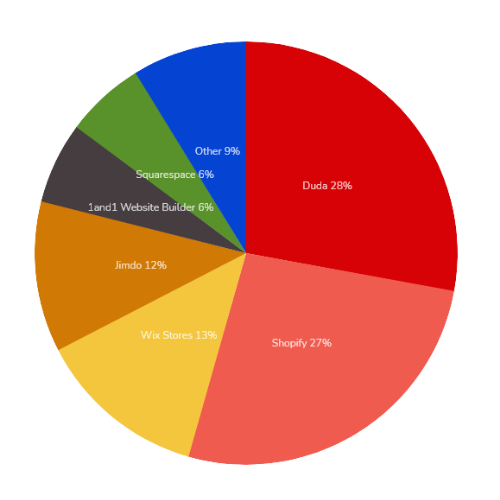Market Share of Hosted CMS or Saas - Software As A Service
Distribution of usage of hosted CMS in France 1.

As of October 23, 2021, the BuiltWith website counts 213,106 websites in France using hosting technology.
These online CMS platforms generally offer two versions: a free version and a paid version.
The free option is often only used to test the technology before purchasing it, whether explicitly or not. They are not recommended as they have very few options and are very restrictive. They can be useful for limited personal use (family or friends) rather than professional use (for an overview of the features, advantages, and disadvantages of different products on the market, refer to the comparison table at the bottom of the page).
In any case, these platforms are built based on the target market: professionals or individuals. Several consequences arise from this2.
1. Development Freedom: No Access to Code
Full access to the site's code, managing its functionalities and setting up a website (its back office, often in PHP or AJAX), is prohibited for all users, whether developers or amateurs, for security reasons (they risk infecting or disrupting the server).
The most "generous" in this regard is Duda. Geared towards developers, it only provides access to the code for modifying the appearance of a website. However, it is also very expensive for the market.
Wix is more oriented towards amateurs and small businesses. It offers a "free" version (which is supported by integrating advertisements on the sites of those who choose this plan), but it is highly restrictive and only allows limited adjustments in the front-end code.
In any case, access to the CMS's code itself is impossible, and users cannot customize its way of working. In summary, they have to work with what these CMS platforms offer to the users. Similarly, developing new features is impossible due to security reasons. Users will have to rely on the existing features provided by the CMS, assuming they already exist.
2. Customization: Themes
In the same vein, CMS platforms limit intervention in the code that manages the website's appearance (the front-end or front-end code in HTML, CSS, or JS). The more they are geared towards amateur users, the more restricted access to this code is.
For example, on Wix, this option is not native. Users need to download a plugin to enable it.
Duda allows this option directly, but in both cases, customization is extremely limited. Working with the predefined themes and structures they offer, personally coded visual effects are unlikely to work properly. This is due to the code structure and what the CMS recognizes as possible.
3. Hosting: Renting a Website
The limited intervention in the code is coupled with another limitation of freedom: the website may not belong to the person creating it.
Using the two aforementioned examples, Wix does not allow users to leave its platform and take the website with them, nor do they have a choice regarding hosting. Wix is the actual owner. If the user stops paying, the website simply won't function.
Duda offers more flexibility and allows users to choose from partner hosts, as well as export the HTML and CSS of their website. Unfortunately, there is still a long list of features and content that cannot be taken along, and this option is only available for those who have chosen one of the two most expensive plans3.
4. Online CMS: Conclusion
After taking two popular hosted CMS platforms as examples—one oriented towards amateur development and the other for professionals—we can observe that the disadvantages of hosted CMS platforms focus on significant limitations in terms of development, functionality, and customization. Websites using the same technology are likely to resemble each other in terms of user experience, interface, and capabilities.
On the other hand, their advantages are based on their drawbacks: the limitations resulting from security concerns make them more secure than open-source CMS platforms. Since their code is hidden, it is more difficult to find vulnerabilities. Automatic updates are handled by the company, not the user.
Similarly, their focus on design and appearance is highly valued by businesses in the marketing and communications field.
Ultimately, they are known for short-term projects and/or small-scale projects.
Annex: Comparison of the advantages and disadvantages of the top 10 online CMS platforms
| Wix | Squarespace | Weebly | Webnode | Jimdo | Webflow | Duda | GoDaddy Websites | Strikingly | One | |
|---|---|---|---|---|---|---|---|---|---|---|
| Advantages |
|
|
|
|
|
|
|
|
|
|
| Disadvantages |
|
|
|
|
|
|
|
|
|
|
Source: https://www.tooltester.com/en/best-website-builder/ (translated from English, page accessed on 11/11/2021).
1. Source: BuiltWith website, https://trends.builtwith.com/shop/hosted-solution/country/France (Page accessed on 04/11/2021).
2. For all these features, see the help center of both CMS on their respective websites: WIX: http://urlr.me/pDr9x, http://urlr.me/fBH15 and DUDA: http://urlr.me/Krbh4, http://urlr.me/ZzYjG (Pages accessed on 08/11/2021).
3. Source: Duda website, https://support.duda.co/hc/fr-fr/articles/360061888493-Exportation-du-site.